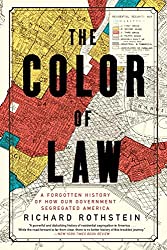
Rating: 8.4/10.
Summary
Why is America so segregated? It’s often believed that the segregation is de facto, due to cultural reasons like people wanting to live with people of the same race. But this book argues that this is a myth, and in fact, blacks suffered de jure (systematic and legally enforced) discrimination for many years, up until the civil rights movement in the 1960s.
A lot of laws were made to keep blacks segregated and out of white communities. When the Ford plant moved to Milpitas in the 1950s, white residents passed laws preventing blacks from moving in, so the blacks had to commute from Richmond. Many times the laws weren’t overtly racist, but low-income housing projects were consistently built in black neighborhoods, and city halls controlled by whites shot down any attempts to integrate blacks into their communities.
The Supreme Court declared in 1917 that it was legal to sell your house to a black person (Buchanan v. Warley), which is a constitutional right. Still, found many creative ways to get around this law, like changing zoning rules on an ad-hoc basis, signing covenant agreements between neighbors to forbid selling to blacks (the idea being that private agreements were outside the scope of the constitution).
Banks considered blacks high risk for mortgages, so refused to give loans in black neighborhoods, so black homeownership was low. Even when loans were given, they were at far worse rates than whites, so blacks had a hard time accumulating wealth. Local governments pulled cheap tricks like refusing to connect the sewers to a black home, moving black schools to the ghettos far from white areas. When racist people destroyed houses owned by black people, the police usually watched without arresting the perpetrators.
After the civil rights movement in the 1960s, overtly targeted racist laws are mostly gone, but the damage is already done. Economic mobility in the US is not that high, so in a country where the rich get richer, equal policies continue to widen the gap. For example, blacks were priced out of home equity and forced to rent in the 1950s, a period of tremendous increase. Thus the book argues we need to fix the injustices of the past; the first step is to recognize the de jure harm dealt to blacks directly by the government and legal system.
Relevance
This book has seen a surge in popularity recently in the wake of the BLM protests, and is helpful for understanding why black people are so poor and have low education and high crime today. The extent of the discrimination is not widely taught. It seems reasonable to try to compensate somehow, but it’s unclear what are the best policies to do so, without alienating non-blacks with overly generous handouts. To be fair, the author is a historian, so future policy making is not his specialty. Also, the book doesn’t talk about how the segregation ended (Martin Luther King is never mentioned), even though it’s not the main topic, just a quick refresher would’ve been useful for me, someone not very familiar with the topic.



